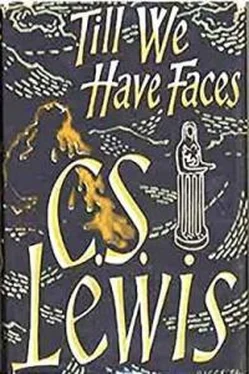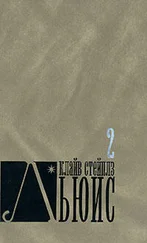But I at least listened no more. I went out to the porch and looked towards the city; a long half–hour. I watched the shadows of the pillars slowly changing their position and it was then I first saw how the things we have known ever since we were weaned can look new and strange, like enemies. And at last I saw Psyche coming, very tired but in great haste. She caught me by the wrist and swallowed, like one that has a sob in the throat, and began leading me away and never stopped till we were in my own chamber. Then she put me in my chair and fell down and laid her head on my knees. I thought she was crying, but when at last she raised her face there were no tears on it.
“Sister,” she said. “What is wrong? I mean, about me.”
“About you, Psyche?” said I. “Nothing. What do you mean?”
“Why do they call me the Accursed?”
“Who has dared? We’ll have his tongue torn out. Where have you been?”
Then it all came out. She had gone (very foolishly, I thought) into the city without a word to any of us. She had heard that her old nurse, the freewoman whom I had hired to suckle her and who now lived in town, was sick with the fever. And Psyche had gone to touch her—“For they all said my hands cured it, and who knows? It might be. I felt as if they did.”
I told her she had done very wrong, and it was then that I fully perceived how much older she had grown since her sickness. For she neither accepted the rebuke like a child nor defended herself like a child, but looked at me with a grave quietness, almost as if she were older than I. It gave me a pang at the heart.
“But who cursed you?” I asked.
“Nothing happened till I had left Nurse’s house; except that no one in the streets had saluted me, and I thought that one or two women gathered their skirts together and drew away from me as I passed. Well, on the way back, first there was a boy—a lovely boy he was, not eight years old—who stared at me and spat on the ground. ‘Oh rude!’ said I, and laughed and held out my hand to him. He scowled at me as black as a little fiend and then lost his courage and ran howling into a doorway. After that the street was empty for a space, but presently I had to pass a knot of men. They gave me black looks as I was passing, and as soon as my back was towards them they were all saying, ‘The Accursed, the Accursed! She made herself a goddess.’ And one said, ‘She is the curse itself.’ Then they threw stones. No, I’m not hurt. But I had to run. What does it mean? What did I do to them?”
“Do?” said I. “You healed them, and blessed them, and took their filthy diseases upon yourself. And these are their thanks. Oh, I could tear them in pieces! Get up, child. Let me go. Even now—we are king’s daughters still. I’ll go to the King. He may beat me and drag me by the hair as he pleases, but this he shall hear. Bread for them indeed. I’ll—I’ll——”
“Hush, sister, hush,” said Psyche. “I can’t bear it when he hurts you. And I’m so tired. And I want my supper. There, don’t be angry. You look just like our father when you say those things. Let us have supper here, you and I. There is some bad thing coming towards us—I have felt it a long time—but I don’t think it will come tonight. I’ll clap my hands to call your maids.”
Though the words You look just like our father , and from her, had hurt me with a wound that sometimes aches still, I let go my anger and yielded. We supped together and turned our poor meal into a joke and a game and were in a fashion happy. One thing the gods have not taken from me; I can remember all that she said or did that night and how she looked from moment to moment.
But whatever my heart boded, our ruin (and even now I had no clear foresight what it would be) did not fall upon us the next day. A whole train of days went past in which nothing happened, except for the slow, steady worsening of everything in Glome. The Shennit was now no more than a trickle between one puddle and another amid dry mud–flats; it was the corpse of a river and stank. Her fish were dead, her birds dead or gone away. The cattle had all died or been killed or were not worth the killing. The bees were dead. Lions, which had not been heard of in the land for forty years, came over the ridge of the Grey Mountain and took most of the few sheep we had left. The plague never ceased. All through these days I was waiting and listening, watching (when I could) everyone who went out of the palace or came in. It was well for me that the King found plenty of work both for the Fox and me in the Pillar Room. Messengers and letters from the neighbouring kings were coming in every day, demanding impossible things and contrary things, dragging up old quarrels or claiming old promises. They knew how things were in Glome and clustered round us like flies and crows round a dying sheep. My father would pass in and out of his rages a dozen times in one morning. When he was in them he would slap the Fox about the face and pull me by the ears or the hair; and then, between the fits, the tears would stand in his eyes, and he would speak to us more like a child imploring help than a king asking counsel.
“Trapped!” he would say. “No way out. They will kill me by inches. What have I done that all these miseries should fall upon me? I’ve been a god–fearing man all my life.”
The only betterment in these days was that the fever seemed to have left the palace. We had lost a good many slaves, but we had better luck with the soldiers. Only one died and all the rest were now back at duty.
Then we heard that the Priest of Ungit had recovered from his fever. His sickness had been very long, for he had taken the fever and won over it and then taken it again, so that it was a wonder he should be alive. But it was noticed for a strange and unlucky thing about this sickness that it killed the young more easily than the old. On the seventh day after this news the Priest came to the palace. The King, who saw his coming (as I did too) from the windows of the Pillar Room, said, “What does the old carrion mean by coming here with half an army?” There were indeed a good many spears behind his litter, for the house of Ungit has its own guards and he had brought a big handful with him. They grounded their spears some distance from our gates, and only the litter was carried to the porch. “They’d better come no nearer,” said the King. “Is this treason or only pride?” Then he gave some order to the captain of his own guard. I don’t think he expected it would come to a fight, but that was what I, being still young, looked for. I had never seen men fight and, being as big a fool in that way as most girls, I felt no dread; rather, a little tingling that I liked well enough.
The bearers set down the litter and the Priest was lifted out of it. He was very old now and blind, and he had two temple girls with him to lead him. I had seen their kind before, but only by torchlight in the house of Ungit. They looked strange under the sun, with their gilt paps and their huge flaxen wigs and their faces painted till they looked like wooden masks. Only these two and the Priest, with one hand on a shoulder of each, came into the palace. As soon as they were in, my father called out to our men to shut and bar the door. “The old wolf would hardly walk into such a trap if he meant mischief,” he said. “But we’ll make sure.”
The temple girls led the Priest into the Pillar Room, and a chair was set for him and he was helped into it. He was out of breath and sat for a long time before he spoke, making a chewing motion with his gums as old men do. The girls stood stiffly at each side of his chair, their meaningless eyes looking always straight ahead out of the mask of their painting. The smell of old age, and the smell of the oils and essences they put on those girls, and the Ungit smell, filled the room. It became very holy.
Читать дальше











